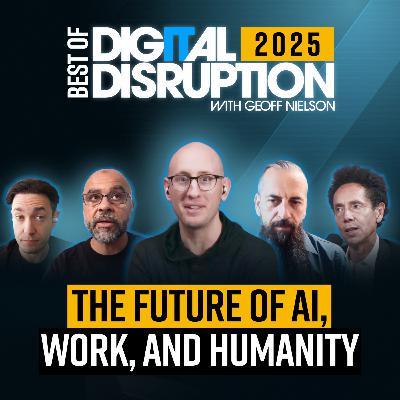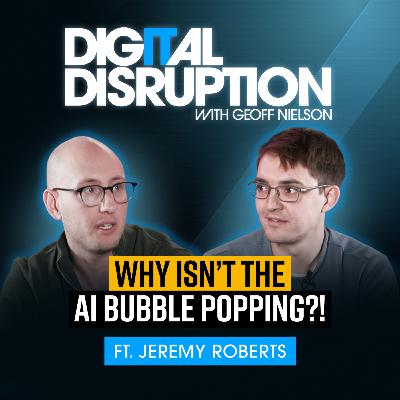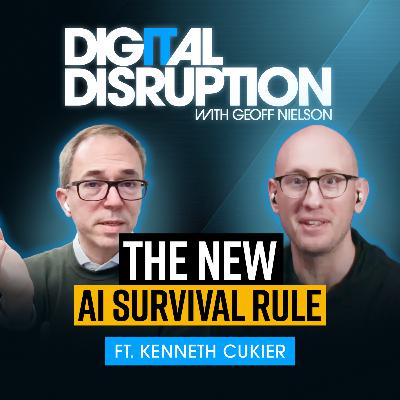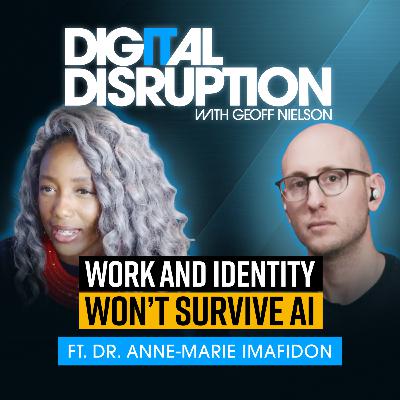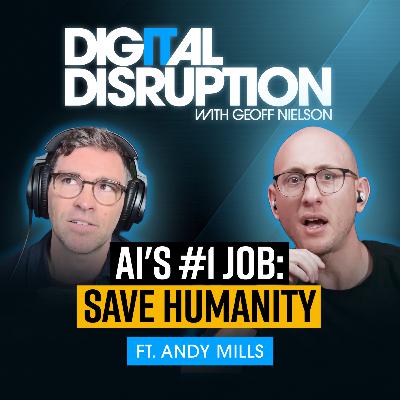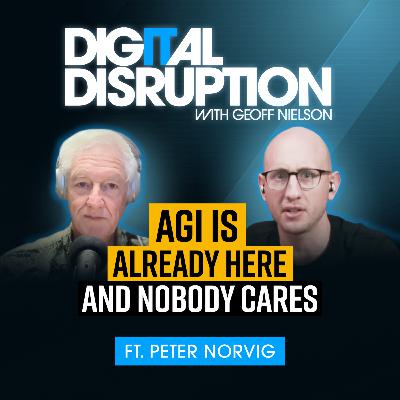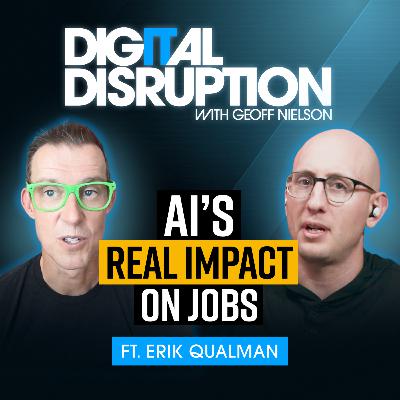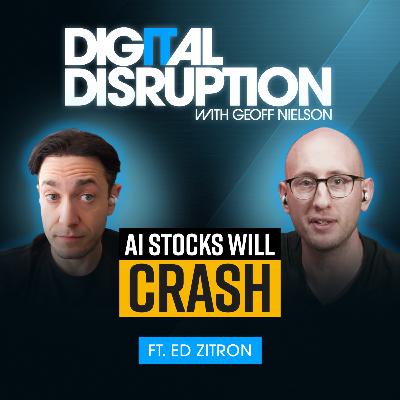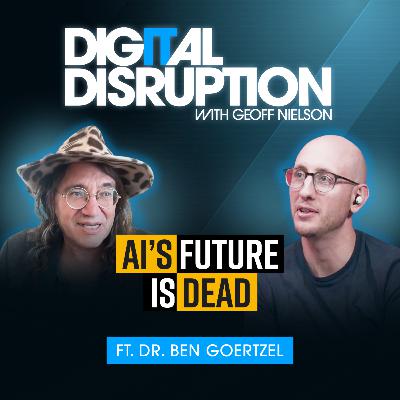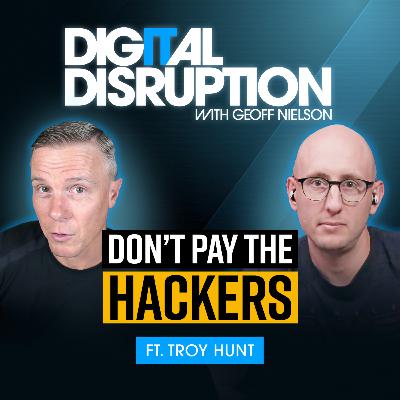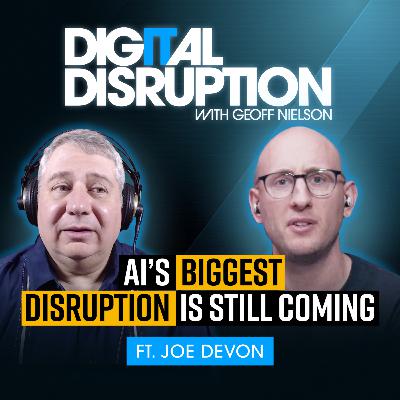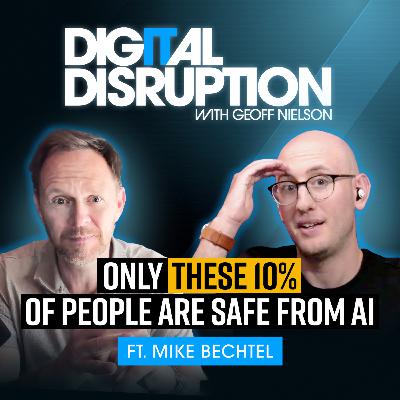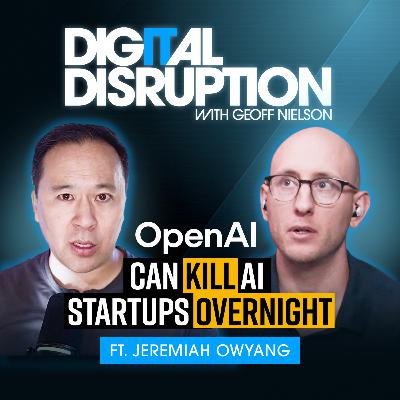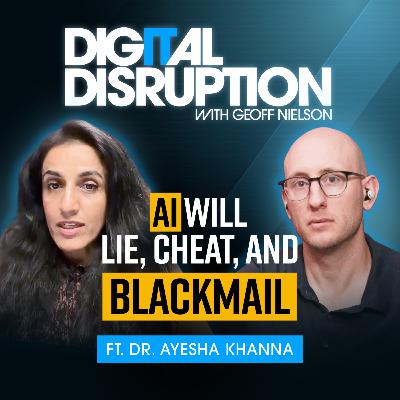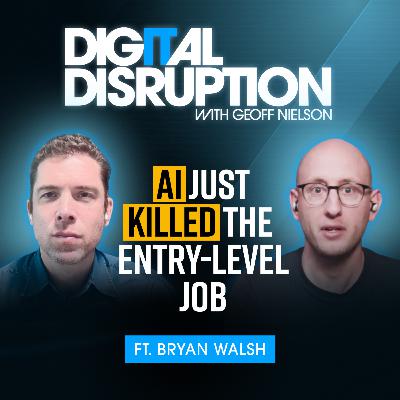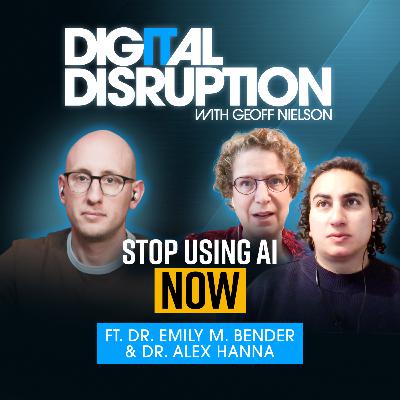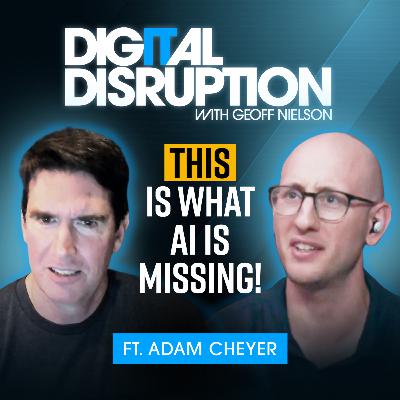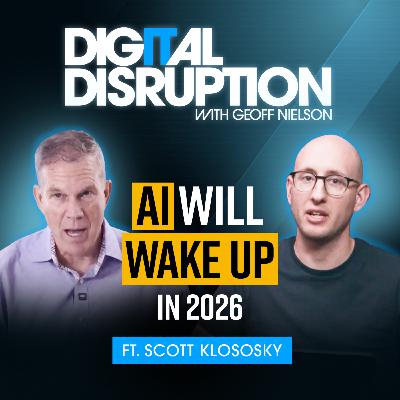Discover Digital Disruption with Geoff Nielson
Digital Disruption with Geoff Nielson

Digital Disruption with Geoff Nielson
Author: Info-Tech Research Group
Subscribed: 64Played: 691Subscribe
Share
© Info-Tech Research Group
Description
The Next Industrial Revolution is Already Here
Digital Disruption is where industry leaders and experts share insights on leveraging technology to build the organizations of the future.
As intelligent technologies reshape our lives and our livelihoods, we speak with the thinkers, the doers and innovators who will help us predict and harness this disruption. Join us as we explore how to adapt to and harness digital transformation.
Digital Disruption is where industry leaders and experts share insights on leveraging technology to build the organizations of the future.
As intelligent technologies reshape our lives and our livelihoods, we speak with the thinkers, the doers and innovators who will help us predict and harness this disruption. Join us as we explore how to adapt to and harness digital transformation.
45 Episodes
Reverse
Is artificial intelligence humanity’s greatest salvation, or the most dangerous force we’ve ever unleashed?Artificial intelligence is no longer a future concept, it’s a force already reshaping geopolitics, economics, warfare, and the human experience itself. In this year in review episode of Digital Disruption, we bring together the most provocative, conflicting, and urgent ideas from this past year to confront the biggest question of our time: What does AI actually mean for humanity’s future?Across more than 40 conversations with leading technologists, journalists, researchers, and futurists, one theme dominated every debate, AI. Some guests argue that artificial general intelligence (AGI) and superintelligence could trigger an extinction-level event. Others believe AI may usher in an era of total abundance, solving humanity’s hardest problems. And still others claim today’s AI hype is little more than marketing smoke and mirrors.This episode puts those worldviews head-to-head.In this episode:00:00 The AI singularity is here05:00 Existential threat or greatest opportunity?10:00 Why no one agrees on ai’s future15:00 The race toward AGI and superintelligence20:00 The control problem nobody has solved25:00 Intelligence has no morality30:00 Capitalism, venture capital, and the AI arms race35:00 Is AI just a marketing illusion?40:00 Generative AI: Power, limits, and misuse45:00 Autonomous weapons and modern warfare50:00 Fear as the driver of dangerous innovation55:00 Why AI is not like nuclear weapons1:00:00 The first and second AI dilemmas1:05:00 Handing decisions over to machines1:10:00 Collapse, abundance, or course correction?Visit our website: https://www.infotech.com/?utm_source=youtube&utm_medium=social&utm_campaign=podcastFollow us on YouTube: https://www.youtube.com/@InfoTechRG
Are companies preparing for an AI-powered future or reacting out of fear of being left behind?Looking ahead to 2026, Geoff Nielson and Jeremy Roberts sit down for an unfiltered conversation about artificial intelligence, the economy, and the future of work. As AI hype accelerates across markets, boardrooms, and headlines, they ask the hard questions many leaders and workers are quietly worrying about: Are we in an AI bubble? If so, what happens when expectations collide with reality? This episode explores whether today’s massive investment in AI, GPUs, infrastructure, copilots, and generative tools is laying the foundation for long-term value or repeating the familiar patterns of past tech bubbles like the dot-com boom and the subprime mortgage crisis. Geoff and Jeremy break down why traditional metrics like price-to-earnings ratios matter, why Nvidia and big tech dominate the narrative, and why the real risk may not be collapse but widespread underperformance. The conversation goes far beyond markets. They dig into the impact of AI on jobs, layoffs, and corporate restructuring, challenging the idea that AI is “taking jobs” versus being used as convenient cover for economic tightening. From IT, HR, and operations to customer-facing roles, they examine how AI could reshape workforce composition, accelerate automation, and create a new and potentially unsettling employment equilibrium. You’ll also hear a candid critique of how organizations are actually using AI today and what is to come next in 2026.Tech Trends Report 2026: https://www.infotech.com/research/ss/tech-trends-2026?utm_source=youtube&utm_medium=social&utm_campaign=researchIn this video:00:00 Just add AI to everything?03:45 Looking ahead to 2026: Nobody knows what’s coming07:10 Are we in an AI bubble? 12:30 Comparing AI to the dot-com and 2008 crashes18:10 Nvidia, GPUs, and the AI Gold Rush24:20 Why AI infrastructure may be ahead of real-world use cases.30:40 Markets untethered from reality36:50 is AI really taking jobs or is something else happening?43:30 The real employment question for 202649:40 Corporate bloat, back-office roles, and automation56:10 Why most AI projects fail to deliver value1:02:45 From productivity theater to real ROI1:09:20 Faster horses vs. Real cars in AI1:15:40 AI 2.0: Agents, experiments, and what comes next1:22:10 The real risk ahead: Underperformance, not collapseVisit our website: https://www.infotech.com/?utm_source=youtube&utm_medium=social&utm_campaign=podcastFollow us on YouTube: https://www.youtube.com/@InfoTechRG
Are we using AI in a way that actually makes us smarter or are we unknowingly making ourselves less capable, less curious, and easier to automate?On this episode of Digital Disruption, we are joined by artificial intelligence expert and neuroscientist, Dr. Vivienne Ming.Over her career, Dr. Vivienne Ming has founded 6 startups, been chief scientist at 2 others, and founded The Human Trust, a philanthropic data trust and “mad science incubator” that explores seemingly intractable problems—from a lone child’s disability to global economic inclusion—for free. She co-founded Dionysus Health, combining AI and epigenetics to invent the first ever biological test for postpartum depression and change the lives of millions of families. She also develops AI tools for learning at home and in school, models of bias in hiring and promotion, and neurotechnologies to treat dementia and TBI. Vivienne was named one of “10 Women to Watch in Tech” by Inc. Magazine and one of the BBC’s 100 Women in 2017. She is featured frequently for her research and inventions in The Financial Times, The Atlantic, Quartz Magazine and the New York Times.Dr. Vivienne Ming sits down with Geoff to unpack one of the most misunderstood truths about artificial intelligence: AI isn’t here to replace your thinking it’s here to challenge it. And whether you grow or get left behind depends entirely on how you choose to engage with it. Dr. Ming reveals why most organizations and most individuals are using AI in the worst possible way. Instead of creating leverage, they’re creating “work slop,” cognitive dependency, shallow automation, and declining human capability. She explains why the real competitive advantage in the AI age comes from productive friction, creative complementarity, and teams that know how to use AI to explore the ill-posed problems—the ambiguous, uncertain, high-value challenges machines can’t solve on their own. From how to robot-proof your company, to why AI tutors fail when they give answers, to the science of courage, reward systems, and organizational culture, this conversation is one of the most honest explorations of the future of human capability in an AI-saturated world. In this video:00:00 Intro02:30 The real value of hybrid intelligence05:00 Cognitive automation vs. true complementarity08:20 Ill-posed problems: where humans still win12:10 What elite performers really do differently16:00 The paradox of AI: why more automation creates more work18:30 How hybrid teams beat prediction markets20:50 Inequality & imagination disease in AI23:10 AI tutors & the golden rule: never give the answer28:00 The nemesis prompt: how to robot-proof yourself44:20 Courage, ethics & reward structures in organizations54:00 Using AI without losing the human story01:06:30 How to robot-proof your companyConnect with Vivienne:Website: https://socos.org/about-vivienneLinkedIn: https://www.linkedin.com/in/vivienneming/Visit our website: https://www.infotech.com/?utm_source=youtube&utm_medium=social&utm_campaign=podcastFollow us on YouTube: https://www.youtube.com/@InfoTechRG
If AI is becoming a “playground” for experimentation, are today’s organizations bold enough to explore it or are they still too afraid to try?On this episode of Digital Disruption, we are joined by Kenneth Cukier, Deputy Executive Editor at The Economist and bestselling author.Kenneth Cukier is the Deputy Executive Editor at The Economist. He is the author of several books on technology and society, notably “Framers” on the power of mental models and the limitations of AI, with Viktor Mayer-Schönberger and Francis de Vericourt, as well as “Big Data: A Revolution That Transforms How We Live, Work and Think” with Viktor. It was a NYT bestseller translated into over 20 languages, and sold over two million copies worldwide. It won the National Library of China’s Wenjin Book Award and was a finalist for the FT Business Book of the Year. Kenn also coauthored a follow-on book, “Learning with Big Data: The Future of Education”. He has been a frequent commentator on CBS, CNN, NPR, the BBC and was a member of the World Economic Forum’s global council on data-driven development.Kenneth has spent decades at the intersection of AI, journalism, business strategy, and global policy. In this conversation, he sits down with Geoff to share candid insights on how AI is reshaping organizations, leadership, economics, and the future of work. He breaks down the real state of AI, what’s hype, what’s real, and what it means for workers, leaders, and companies. Kenneth explains how AI is shifting from automating tasks to expanding the frontier of knowledge, why today’s multi-trillion-dollar AI investment wave is both overhyped and underhyped, and how everything from healthcare to management is poised to transform. This episode explores why most companies should treat AI as a “playground” for experimentation, how The Economist is using generative AI behind the scenes, the human skills needed to stay competitive, and why great leadership now requires enabling curiosity, psychological safety, and responsible innovation. Kenneth also unpacks the growing “AI-lash,” the limits of GDP as a measure of progress, and why the organizations that learn fastest, not the ones that simply know the most, will win the future.In this episode:00:00 Intro05:00 AI Today: Overhyped, underhyped, or both?10:00 From Big Data to LLMs: How we got here15:00 The $3 trillion AI wave: What it really signals20:00 Automation vs. knowledge expansion25:00 Inside The Economist: How they actually use Generative AI30:00 Why “more content” isn’t a strategy35:00 Leadership in the age of AI: Curiosity, judgment, culture40:00 The skills humans must keep and why they matter more now45:00 The rise of the “AI-lash” and public skepticism50:00 GDP, progress, and what we’re measuring wrong55:00 Why the fastest learners win the future1:01:00 What can this technology really do?Connect with Kenneth:Connect with Kenneth:Website: http://www.cukier.com/LinkedIn: https://www.linkedin.com/in/kenneth-cukier-9ab56335/X: https://x.com/kncukierVisit our website: https://www.infotech.com/?utm_source=youtube&utm_medium=social&utm_campaign=podcastFollow us on YouTube: https://www.youtube.com/@InfoTechRG
What does the future of work really look like when AI, identity, and culture collide?On this episode of Digital Disruption, we’re joined by Dr. Anne-Marie Imafidon, Chair of the Institute for the Future of Work.Anne-Marie is a leading voice in the tech world, known for her work as a trustee at the Institute for the Future of Work and as the temporary Arithmetician on Channel 4’s Countdown. A former child prodigy who passed A-level computing at 11 and earned a Master’s in Maths and Computer Science from Oxford by 20, she has since spoken globally for companies including Facebook, Amazon, Google and Mastercard. She hosts the acclaimed Women Tech Charge podcast and is a sought-after presenter who has interviewed figures such as Jack Dorsey and Sir Lewis Hamilton. Anne-Marie has received multiple Honorary Doctorates, serves on several national boards, and continues to champion diversity and innovation in tech. Her latest book, She’s In CTRL, was published in 2022.Dr. Anne-Marie joins Geoff to break down how AI, big data, quantum, and the wider “Fourth Industrial Revolution” are transforming jobs, workplaces, identity, culture, and society. From redefining long-held beliefs about “jobs for life,” to the cultural fractures emerging between companies, workers, and society, Dr. Anne-Marie goes deep on what’s changing, what still isn’t understood, and what leaders must do right now to avoid being left behind. This conversation dives into why most AI use cases are still limited to fraud detection and customer service, and the hidden cultural blockers preventing real transformation. She emphasizes the danger of hype cycles, and how to stay focused on real value and how to build organizations that can experiment, learn, and make “high-quality mistakes.”In this episode:00:00 Intro00:31 The Future of Work: What’s changing now02:32 Generational identity, legacy jobs & why work is no longer “for life”04:36 Work identity crisis & fragmentation of modern careers07:45 Rethinking digital transformation & the fourth industrial revolution11:36 Why the institute avoids the AI hype & looks beyond it13:39 AI Hype vs. reality17:50 High-quality mistakes21:06 Tech design failures23:18 Culture, customers & building organizations that reflect the real world29:04 Destroying the “Einstein Myth” & rewriting who tech is for39:37 First-principles thinking50:34 Norms, unintended consequences & system-level change55:32 When will the dust settle? ai timelines, disruption & what’s next57:28 Closing thoughtsConnect with Dr. Ann-Marie:LinkedIn: https://www.linkedin.com/in/aimafidon/Instagram: https://www.instagram.com/notyouraverageami/Visit our website: https://www.infotech.com/?utm_source=youtube&utm_medium=social&utm_campaign=podcastFollow us on YouTube: https://www.youtube.com/@InfoTechRG
When intelligence becomes abundant, what happens to humanity’s purpose?Andy Mills, the co-founder of The New York Times’ The Daily and creator of The Last Invention, joins us on this episode of Digital Disruption.Andy is a reporter, editor, podcast producer, and co-founder of Longview. His most recent series, The Last Invention, explores the AI revolution, from Alan Turing’s early ideas to today’s fierce debates between accelerationists, doomers, and those focused on building the technology safely. Before that, he co-created The Daily at The New York Times and produced acclaimed documentary series including Rabbit Hole, Caliphate, and The Witch Trials of J.K. Rowling. A former fundamentalist Christian from Louisiana and Illinois, Andy now champions curiosity, skepticism, and the transformative power of listening to people with different perspectives, values that shape his award-winning journalism across politics, terrorism, culture wars, technology, and science. Andy sits down with Geoff to break down the real debate shaping the future of AI. From the “doomers” warning of existential risk to the accelerationists racing toward AGI, Andy maps out the three major AI camps influencing policy, economics, and the future of human intelligence. This conversation explores why some researchers fear AGI, why others believe it will save humanity, how job loss and automation could reshape society, and why 2025 is becoming an “AI 101 moment” for the public. Andy also shares what he’s learned after years investigating OpenAI, Anthropic, xAI, and the people behind the AGI race. If you want clarity on AGI, existential risk, the future of work, and what it all means for humanity, this is an episode you won’t want to miss. In this episode:00:00 Intro01:00 The three camps of AI: doom, acceleration, scouts05:00 Why skeptics aren’t driving the AI debate07:00 Job loss, productivity & “good” vs. “bad” disruption09:00 Existential risk & why scientists are sounding alarms12:00 The origins of doomers and accelerationists17:00 How AI debates escalated after ChatGPT22:00 Why 2025 is an AI “101 moment” for the public24:00 The tech stack wars: OpenAI, Anthropic, xAI28:00 Why leaders joined the AI race30:00 The accelerationist mindset33:00 Contrarians, symbolists & the forgotten history of AI39:00 Big Tech, branding & why AI CEOs avoid open conflict42:00 The closed group chats of AI’s elite builders46:00 Sci-Fi narratives vs. real-world intelligence risks52:00 The AI bubble & why adoption is unlike any tech before01:00:00 Are we entering a wright-brothers-to-moon-landing era?01:10:00 What AGI means for capitalism, work & purpose01:18:00 Why public debate needs to start now01:20:00 What happens nextConnect with Andy:Website: https://www.andymills.work/aboutVisit our website: https://www.infotech.com/?utm_source=youtube&utm_medium=social&utm_campaign=podcastFollow us on YouTube: https://www.youtube.com/@InfoTechRG
Are we chasing the wrong goal with Artificial General Intelligence, and missing the breakthroughs that matter nowOn this episode of Digital Disruption, we’re joined by former research director at Google and AI legend, Peter Norvig.Peter is an American computer scientist and a Distinguished Education Fellow at the Stanford Institute for Human-Centered Artificial Intelligence (HAI). He is also a researcher at Google, where he previously served as Director of Research and led the company’s core search algorithms group. Before joining Google, Norvig headed NASA Ames Research Center’s Computational Sciences Division, where he served as NASA’s senior computer scientist and received the NASA Exceptional Achievement Award in 2001.He is best known as the co-author, alongside Stuart J. Russell, of Artificial Intelligence: A Modern Approach — the world’s most widely used textbook in the field of artificial intelligence.Peter sits down with Geoff to separate facts from fiction about where AI is really headed. He explains why the hype around Artificial General Intelligence (AGI) misses the point, how today’s models are already “general,” and what truly matters most: making AI safer, more reliable, and human-centered. He discusses the rapid evolution of generative models, the risks of misinformation, AI safety, open-source regulation, and the balance between democratizing AI and containing powerful systems. This conversation explores the impact of AI on jobs, education, cybersecurity, and global inequality, and how organizations can adapt, not by chasing hype, but by aligning AI to business and societal goals. If you want to understand where AI actually stands, beyond the headlines, this is the conversation you need to hear. In this episode:00:00 Intro01:00 How AI evolved since Artificial Intelligence: A Modern Approach03:00 Is AGI already here? Norvig’s take on general intelligence06:00 The surprising progress in large language models08:00 Evolution vs. revolution10:00 Making AI safer and more reliable12:00 Lessons from social media and unintended consequences15:00 The real AI risks: misinformation and misuse18:00 Inside Stanford’s Human-Centered AI Institute20:00 Regulation, policy, and the role of government22:00 Why AI may need an Underwriters Laboratory moment24:00 Will there be one “winner” in the AI race?26:00 The open-source dilemma: freedom vs. safety28:00 Can AI improve cybersecurity more than it harms it?30:00 “Teach Yourself Programming in 10 Years” in the AI age33:00 The speed paradox: learning vs. automation36:00 How AI might (finally) change productivity38:00 Global economics, China, and leapfrog technologies42:00 The job market: faster disruption and inequality45:00 The social safety net and future of full-time work48:00 Winners, losers, and redistributing value in the AI era50:00 How CEOs should really approach AI strategy52:00 Why hiring a “PhD in AI” isn’t the answer54:00 The democratization of AI for small businesses56:00 The future of IT and enterprise functions57:00 Advice for staying relevant as a technologist59:00 A realistic optimism for AI’s futureConnect with Peter:LinkedIn: https://www.linkedin.com/in/pnorvig/Visit our website: https://www.infotech.com/?utm_source=youtube&utm_medium=social&utm_campaign=podcastFollow us on YouTube: https://www.youtube.com/@InfoTechRG
Is “AI-first” the future of business or just another tech buzzword?On this episode of Digital Disruption, we’re joined by former Google Chief Decision Scientist and CEO of Kozyr, Cassie Kozyrkov.Cassie is best known for founding the field of Decision Intelligence and serving as Google’s first Chief Decision Scientist, where she helped lead the company’s AI-first transformation. A sought-after advisor and keynote speaker, Cassie has guided organizations including Gucci, NASA, Meta, Spotify, Salesforce, and GSK on AI strategy. She combines deep technical expertise with theater-trained charisma to make complex concepts engaging and actionable for executive and general audiences alike delighting audiences in over 40 countries across all seven continents, including stages at the UN, WEF, Web Summit, and SXSW.Cassie sits down with Geoff to unpack the hidden cost of the “AI-first” hype, the dangers of AI infrastructure debt, and why real AI readiness starts with people, not technology. She reveals how leaders can architect their organizations for innovation, build human-in-the-loop systems, and create cultures that embrace experimentation instead of fearing mistakes.Cassie exposes why 95% of organizations fail to achieve measurable ROI from AI and how leaders can finally bridge the AI value gap. This conversation dives into why AI success isn’t about tools, it’s about leadership, measurement, and mindset.Most organizations chasing “AI transformation” see no measurable ROI not because the technology fails, but because leaders are still measuring value the old way. Generative AI success is hard to quantify when there isn’t a single “right answer,” yet many businesses keep trying to apply outdated metrics to a completely new paradigm.In this video:00:00 Intro00:44 The Generative AI Value Gap: Why 95% get no ROI02:20 The paradox of AI productivity05:38 Why measuring AI value is harder than we think12:04 Leadership abdication: “Just sprinkle AI on everything”15:10 AI infrastructure debt explained20:17 What real AI readiness looks like (beyond tech)23:42 Humans as part of AI infrastructure28:00 Why “AI-first” isn’t one-size-fits-all33:31 Building human judgment into AI systems36:19 The risks of scaling too fast41:34 Automation vs augmentation: where leaders go wrong44:00 The “do the work” approach to AI success48:35 The recipe for an AI-ready organization53:40 Guardrails, governance, and security in AI systems57:00 Thinking probabilistically: a new mindset for leaders1:03:20 The human side of AI transformation1:06:45 Leading through uncertaintyConnect with Cassie:Website: https://www.kozyr.com/aboutLinkedIn: https://www.linkedin.com/in/kozyrkov/X: https://x.com/decisionleaderYouTube: https://www.youtube.com/c/KozyrkovVisit our website: https://www.infotech.com/?utm_source=youtube&utm_medium=social&utm_campaign=podcastFollow us on YouTube: https://www.youtube.com/@InfoTechRG
Why is adaptability the real superpower for leaders in the digital age?On this episode of Digital Disruption, we’re joined by Erik Qualman, a digital leadership expert, best-selling author, and motivational speaker.Erik is a 5x #1 Bestselling Author and Keynote Speaker who has inspired audiences in over 55 countries and reached 50 million people. Voted the #2 Most Likeable Author in the World behind J.K. Rowling, his work Socialnomics has been featured on 60 Minutes, in The Wall Street Journal, and used by organizations from the National Guard to NASA. A professor of Digital Leadership at Northwestern University, Qualman’s research and courses are studied at 500+ universities worldwide. Through his animation studio, he has partnered with brands like Disney, Oreo, Chase, and Cartier. A former MIT and Harvard edX professor and honorary doctorate recipient, Qualman is also the creator of the bestselling board game Kittycorn.Erik joins Geoff Nielson to break down what it really means to be AI-ready. He reveals why the leaders who know how to leverage AI and adapt fast will replace those who don’t. He explains why AI is overhyped in the short term but underhyped in the long term, and how the most successful leaders of the next decade will blend Flintstones-level human connection with Jetsons-era innovation. Erik explains why adaptability and emotional intelligence (EQ) are the new competitive edge in the age of artificial intelligence. This conversation explores how AI can remove friction, save time, and ironically help us become more human, while also exploring the guardrails needed for responsible tech adoption. Erik also shares lessons from advising some of the world’s top brands including Facebook, Disney, and Sony and explains why the future favors those who fail fast, fail forward, and fail better.In this video:00:00 Intro02:00 The “Flintstones First” approach to digital leadership04:40 How AI helps us become more human06:15 Winners, losers, and adaptability in the AI era08:30 Emotional intelligence and leadership in a tech-driven world11:00 The need for guardrails in AI and social media13:00 Teaching AI and digital leadership at Northwestern15:00 How technology is transforming the classroom17:45 The 70/30 rule: what changes vs. what never will19:00 Core advice for leaders and digital innovators21:30 Avoiding hype: testing new tech like AI and Clubhouse23:00 Lessons from Montblanc and the origins of “Digital Leadership”25:00 The Disney+ story: digital transformation done right27:00 Building a culture of “fail fast, fail forward, fail better”30:00 Balancing the Flintstones and the JetsonsConnect with Erik:Website: https://equalman.com/LinkedIn: https://www.linkedin.com/in/qualman/X: https://x.com/equalmanYouTube: @equalmanVisit our website: https://www.infotech.com/?utm_source=youtube&utm_medium=social&utm_campaign=podcastFollow us on YouTube: https://www.youtube.com/@InfoTechRG
Could AI’s biggest impact be economic, not technological?On this episode of Digital Disruption, we’re joined by the founder of EZPR and host of Better Offline podcast, Ed Zitron.Ed is a technology writer, public relations expert, and podcaster known for his critical takes on the tech industry and its biggest players. His work has appeared in leading outlets including The Atlantic, Business Insider, and TechCrunch. He is the author of the popular newsletter Where’s Your Ed At, launched in 2020, where he explores the intersection of technology, business, and culture. Ed also hosts the Better Offline podcast, delving into the realities of the tech industry and the ripple effects of the AI boom. With his candid insights and thoughtful commentary, Ed has become a trusted voice and sought-after speaker within the tech community. One of the most outspoken critics of the AI boom, Ed Zitron joins Geoff to cut through the noise and talk about the truth behind generative AI. Ed breaks down why he believes AI “doesn’t work,” what’s really driving the trillion-dollar hype, and why big tech, media, and investors may be steering straight into the next Enron moment. This conversation unpacks why large language models fall short, how Microsoft’s AI Copilot has failed to deliver, and how corporate opportunism and investor “vibes” are fueling one of the biggest speculative bubbles in tech history. They also explore the “Enron-like” risks in the AI hardware race, the potential fallout for retail investors and startups, and tackle one of tech’s most misunderstood narratives, the myth of AI-driven job loss, revealing who’s really being replaced. In this episode:00:00 Intro00:36 “AI doesn’t work”02:05 The limits of LLMs 04:33 Microsoft Copilot and the illusion of productivity07:05 The AI job myth: Who’s really being replaced?10:00 CEOs, opportunism, and the false narrative of AI efficiency12:00 The Salesforce example: Lies, hype, and failure to deliver14:00 What AI can actually do 18:00 The trust problem19:45 Media complacency and tech industry collusion22:00 Microsoft, Nvidia, and false growth25:00 The Enron parallels28:30 Why investors are rewarding bad behavior31:00 Who gets hurt when the AI bubble bursts? 35:00 Unsustainable startups and rising model costs38:00 The coming collapse of AI infrastructure40:00 What business leaders should do now to avoid being burned44:30 The harsh truth about ChatGPT49:00 What real innovation looks like: Batteries, EVs, AR, and more54:00 The future of work beyond AI hypeConnect with Ed:LinkedIn: https://www.linkedin.com/in/edzitron/X: https://x.com/edzitronInstagram: instagram.com/edzitronVisit our website: https://www.infotech.com/?utm_source=youtube&utm_medium=social&utm_campaign=podcastFollow us on YouTube: https://www.youtube.com/@InfoTechRG
Is the AI arms race between tech giants and nations pushing us toward a dangerous future?On this episode of Digital Disruption, we’re joined by the founder of SingularityNET and the pioneering mind behind the term Artificial General Intelligence (AGI), Dr. Ben Goertzel.Dr. Ben Goertzel is a leading figure in artificial intelligence, robotics, and computational finance. Holding a Ph.D. in Mathematics from Temple University, he has been a pioneer in advancing both the theory and practical applications of AI, particularly in the pursuit of artificial general intelligence (AGI) a term he helped popularize. He currently leads the SingularityNET Foundation, TrueAGI, the OpenCog Foundation, and the AGI Society, and has organized the Artificial General Intelligence Conference for over fifteen years. A co-founder and principal architect of OpenCog, an open-source project to build human-level AI, Dr. Goertzel’s work reflects a singular mission: to develop benevolent AGI that advances humanity’s collective good. Dr. Goertzel sits down with Geoff to share his insights on the accelerating progress toward AGI, what it truly means, and how it could reshape human life, work, and consciousness. He discusses the role of Big Tech in shaping AI’s direction and how corporate incentives, and commercialization are both driving innovation and limiting true AGI research. From DeepMind and OpenAI to decentralized AI networks, Dr. Goertzel reveals where the real breakthroughs might happen. The conversation also explores the ethics of AI, the dangers of fake democratization and false compassion, and why humanity must shape AI’s evolution with empathy and awareness.In this episode:00:00 Intro00:21 What is Artificial General Intelligence (AGI)?01:10 The pace of AI progress and the hype cycle05:44 The path from human-level AGI to superintelligence09:20 How close are we to AGI? 13:08 Transformer vs. multi-agent systems14:05 Which AI labs might strike AGI gold? (DeepMind, OpenAI, Anthropic)17:07 Big Tech’s innovator’s dilemma and why true AGI may come elsewhere20:20 Predictive coding22:59 Why Big Tech resists new AI training paradigms29:16 Imagining life after AGI: optimism, transhumanism, and choice33:29 Navigating the transition from AGI to ASI37:55 Decentralized vs. centralized control of AGI43:20 Who (or what) will be in control47:19 Risks of power concentration in early AGI development51:01 Who should own and guide AGI?53:06 Why we need participatory governance for intelligent systems54:47 The danger of fake compassion and false democratization1:00:50 Finding meaning in the age of intelligent machines1:04:13 How AGI could help humanity focus on inner growth1:07:20 – Learning how to learn: the last human advantageConnect with Dr. Goertzel:LinkedIn: https://www.linkedin.com/in/bengoertzel/X: https://x.com/bengoertzelVisit our website: https://www.infotech.com/?utm_source=youtube&utm_medium=social&utm_campaign=podcastFollow us on YouTube: https://www.youtube.com/@InfoTechRG
How are AI and automation shaping both the attack and defense sides of cybersecurity?On this episode of Digital Disruption, we’re joined by the founder and CEO of Have I Been Pwned, Troy Hunt.Troy Hunt is an Australian security researcher and the founder of the data breach notification service, Have I Been Pwned. With a background in software development specializing in information security, Troy is a regular conference speaker and trainer. He frequently appears in the media, collaborates with government and law enforcement agencies, and has appeared before the U.S. Congress as an expert witness on the impact of data breaches. Troy also serves as a Microsoft Regional Director (an honorary title) and regularly blogs at troyhunt.com from his home on Australia’s Gold Coast.Troy sits down with Geoff to share eye-opening insights on the evolving threat landscape of 2025 and beyond. Despite the rise of AI and automation, Troy emphasizes that many of today’s most damaging data breaches and ransomware attacks still stem from basic human error and social engineering. He explains how ransomware has shifted from encrypting files to threatening data disclosure, making it harder for organizations to manage risk and justify ransom payments. The conversation also touches on how breach fatigue and apathy have led many individuals and businesses to underestimate cybersecurity risks, even as incidents rise globally. He also highlights how AI tools are being weaponized by both defenders and attackers and argues that cybersecurity isn’t about perfect protection but about finding equilibrium: balancing usability, education, and risk mitigation.In this episode: 00:00 Intro01:15 Why human weakness beats AI02:00 Young hackers and the rise of scattered spider04:00 From hacktivists to career criminals05:00 Ransomware’s new tactics07:30 Should companies pay the ransom? 10:20 Can you ever be fully protected? Defense vs. response11:20 How to convince boards cybersecurity is worth the money14:20 Breach fatigue and public apathy18:00 Reframing what ‘sensitive data’ really means20:00 Passwords, reuse, and the real risk equation24:00 Biometrics, face ID & the future of authentication26:30 Threat Modeling 10127:30 Barriers to cyber preparedness29:30 How Have I Been Pwned works 32:00 The Future of Data Breaches38:00 Microsoft’s Role in the Security Ecosystem40:30 AI Hype vs. reality in cybersecurity43:00 When AI helps hackers 52:00 Why transparency still matters after every breach54:00 Accepting risk, building resilienceConnect with Troy:Website: https://www.troyhunt.com/LinkedIn: https://www.linkedin.com/in/troyhunt/X: https://x.com/troyhuntVisit our website: https://www.infotech.com/?utm_source=youtube&utm_medium=social&utm_campaign=podcastFollow us on YouTube: https://www.youtube.com/@InfoTechRG
What does the future of digital experiences look like when AI, accessibility, and entrepreneurship collide?On this episode of Digital Disruption, we’re joined by serial tech entrepreneur, accessibility advocate, and co-founder of Global Accessibility Awareness Day (GAAD), Joe Devon.As Chair of the GAAD Foundation, Joe strives to disrupt the culture of technology and digital product development by embedding accessibility as a core requirement. Inspired by his 2011 blog post highlighting the need for mainstream accessibility knowledge among developers, GAAD has grown into an annual event observed on the third Thursday of May, promoting digital access and inclusion for over one billion people with disabilities worldwide. He also co-hosts the Accessibility and Gen.AI Podcast, exploring the intersection of accessibility and artificial intelligence.Joe sits down with Geoff to explore how AI startups are reshaping the digital landscape, from code accessibility to the rise of small business innovation. He shares the story of how one blog post led to a global accessibility movement, why AI-driven tools could either democratize or centralize technology, and how the entrepreneurial spirit will define the next decade. From robotics fused with large language models to AI coding assistants generating billions of lines of code, this conversation dives into the challenges, risks, and opportunities for entrepreneurs and digital leaders navigating this transformation.In this episode:00:00 Intro00:23 The “ChatGPT moment” for robotics01:23 The mission behind Global Accessibility Awareness Day02:29 How AI shifts the accessibility conversation03:08 Why accessibility matters for everyone06:17 Usability and empathy in digital product design12:28 How AI can unlock inclusion and personalization14:45 Aphantasia, hyperphantasia & diverse human abilities17:34 AI and the future of sign language translation19:23 How to work with disability communities23:59 Advice for leaders getting started with inclusive design25:13 AI coding tools revolutionizing software development29:27 Can AI accessibility become the new standard?30:06 How GAAD became a global movement35:24 Entrepreneurship vs. 9-to-5 in an AI-powered economy45:07 Lessons from the early internet and RSS’s decline47:04 The debate on Universal Basic Income (UBI)50:26 Joe’s father’s influence and the accessibility journey52:34 From a blog post to real change in banking57:13 The rise of AI influencers vs. the value of real humans58:36 Advice for those unsure about entrepreneurshipConnect with Joe:LinkedIn: https://www.linkedin.com/in/joedevon/X: https://x.com/joedevonVisit our website: https://www.infotech.com/?utm_source=youtube&utm_medium=social&utm_campaign=podcastFollow us on YouTube: https://www.youtube.com/@InfoTechRG
What happens when AI becomes as good at thinking as humans and what skills remain uniquely ours?On this episode of Digital Disruption, we’re joined by Mike Bechtel, Chief Futurist at Deloitte.Mike began his career at Accenture Labs, where his team helped Fortune 500 clients put emerging technologies to profitable use. Twelve years and twelve U.S. patents later, he was named the firm’s first Global Innovation Director, tasked with creating the strategy, processes, and culture to foster company-wide intrapreneurship. At Deloitte, Mike and his team focus on making sense of what’s new and next in technology, with the goal of helping today’s leaders arrive at their preferred futures ahead of schedule. He also serves as an adjunct professor at the University of Notre Dame, where he teaches corporate innovation. In 2013, Mike co-founded and served as Managing Director of Ringleader Ventures, a venture capital firm investing in early-stage startups that had—intentionally or not—built simple solutions to complex corporate challenges.Mike sits down with Geoff to talk about the future of AI and what it means for our work, creativity, and humanity. He shares an optimistic vision of a world where automation elevates human potential, allowing people to focus on creativity, innovation, and connection. This conversation challenges how we think about AI, AI art, the future of work, and the role of human skills. Mike draws on his experience advising leaders and students to show how we can prepare for a future where AI isn’t just a tool but a partner in thinking. He shares insights on the ethical challenges of outsourcing thought, why intent matters in how organizations use AI, and why AI is less about replacing jobs and more about automating the “muck” so humans can focus on the magic. Mike also challenges us to consider: what happens to writing, philosophy, and ethics when machines can master technical tasks faster than ever?In this episode:00:00 Intro01:00 Why AI isn’t new (but why this moment matters)04:10 Automation as a Trojan Horse for elevation05:30 Best practices get automated, next practices get built09:50 Expertise vs. curiosity: Why human skills win15:00 From fear to opportunity17:00 What clients really want in the AI era19:20 Automating muck to unlock magic22:00 The revenge of the humanities & synthetic thinking23:00 Writing = thinking: Why we can’t outsource human thought36:15 Why people still matter42:00 Beyond AI: Blockchain, trust & cryptographic futures47:30 Deepfakes, truth, and the math we can trust1:05:50 The future of IT1:08:00 AI Reshaping corporate teams & skills1:14:40 Guidance for the next generation1:19:30 Staying ahead of AI1:21:45 Key takeawaysConnect with Mike:Website: https://mikebech.tel/bioLinkedIn: https://www.linkedin.com/in/mikebechtel/X: https://x.com/mikebechtelVisit our website: https://www.infotech.com/?utm_source=youtube&utm_medium=social&utm_campaign=podcastFollow us on YouTube: https://www.youtube.com/@InfoTechRG
Which strategies separate the AI startups that thrive from those that die?Today on Digital Disruption, we’re joined by Jeremiah Owyang, a venture capitalist at Blitzscaling Ventures.Jeremiah, a longtime Silicon Valley native, leads investments in early-stage AI startups at Blitzscaling Ventures. He focuses on startups with the potential for rapid scale and enduring leadership in valuable markets. He also organizes the popular Llama Lounge: The AI Startup Event Series. As a speaker, Jeremiah forecasts how early-stage technology will reshape business and society and advises audiences on how to turn disruption into advantage.Jeremiah sits down with Geoff to unpack the reality of Silicon Valley’s AI gold rush. With more than 38,000 AI startups competing for attention, thin technical moats, and the looming threat of consolidation, founders face more pressure than ever to stand out. He shares insider insights on why most AI startups are vulnerable to being wiped out by a single update from @OpenAI or Google, which industries and roles are most at risk of automation, and why critical thinking remains one of humanity’s most valuable advantages. The conversation also explores how Gen Alpha, the first AI-native generation, will grow up and work differently than any before, as well as the rise of AI agents and their impact on everyday work. In this video:00:00 Intro01:45 The AI startup explosion04:30 Why most AI startups will fail without real advantages07:10 One OpenAI update could destroy your startup overnight10:25 Thin technical advantages and the search for moats13:40 What VCs look for in AI startups17:05 The rise of Lean AI startups20:15 AI agents and the automation of entry-level jobs23:50 The skills humans still need27:10 Gen Alpha: The first AI-native workforce30:20 AI’s role in corporate strategy and decision-making34:00 The Risks of over-reliance on AI in business37:25 From Gold Rush to shakeout41:10 How CEOs can future-proof their companies in the AI era45:30 Humanoid robots, agents, and the next wave of disruption49:15 Winners and losers in the AI economyConnect with Jeremiah:Website: https://web-strategist.com/blog/about/ LinkedIn: https://www.linkedin.com/in/jowyang/Instagram: https://www.instagram.com/jowyang/X: https://x.com/jowyangVisit our website: https://www.infotech.com/Follow us on YouTube: https://www.youtube.com/@InfoTechRG
What risks come with AI systems that can lie, cheat, or manipulate?Today on Digital Disruption, we’re joined by Dr. Ayesha Khanna, CEO of Addo AI.Dr. Khanna is a globally recognized AI expert, entrepreneur, and CEO of Addo, helping businesses leverage AI for growth. With 20+ years in digital transformation, she advises Fortune 500 CEOs and serves on global boards, including Johnson Controls, NEOM Tonomus, and L’Oréal’s Scientific Advisory Board. A graduate of Harvard, Columbia, and the London School of Economics, she spent a decade on Wall Street advising on information analytics. A thought leader in AI, Dr. Khanna has been recognized as a groundbreaking entrepreneur by Forbes, named to Edelman’s Top 50 AI Creators (2025), and featured in Salesforce’s 16 AI Influencers to Know (2024). Committed to diversity in tech, she founded the charity 21C Girls, which taught thousands of students the basics of AI and coding in Singapore, and currently provides scholarships for mid-career women through her education company Amplify. Ayesha sits down with Geoff to discuss how artificial intelligence is disrupting industries, reshaping the economy, and redefining the future of jobs. This conversation explores why critical thinking will be the most important skill in an AI-driven workplace, how businesses can use AI to scale innovation instead of getting stuck in “pilot purgatory,” and what risks organizations must prepare for, including bias, data poisoning, cybersecurity threats, and manipulative reasoning models. Ayesha shares insights from her work with governments and Fortune 500 companies on building national AI strategies, creating governance frameworks, and balancing innovation with responsibility. The conversation dives into how AI and jobs intersect, whether automation will replace or augment workers and why companies need to focus on growth, reskilling, and strategic automation rather than layoffs. They also discuss the rise of the Hybrid Age, where humans and AI coexist in every part of life, and what it means for society, relationships, and the global economy. In this video:00:00 Intro00:43 The future of AI and the next 5 years02:16 The biggest AI risks05:25 Fake alignment & governance09:08 Why AI pilots fail15:30 What successful companies do23:14 AI and jobs: Automation, reskilling, and why critical thinking matters most29:39 The Hybrid Age37:09 AI and society: relationships with AI, human agency, and ethical concerns46:13 Global AI strategies54:00 Overhyped narratives and what people get wrong about AI and jobs56:27 The Skills Gap opportunity58:31 The importance of risk frameworks, critical thinking, and optimismConnect with Dr. KhannaWebsite: https://www.ayeshakhanna.com/LinkedIn: https://www.linkedin.com/in/ayeshakhanna/X: (21) Dr. Ayesha Khanna (@ayeshakhanna1) / XVisit our website: https://www.infotech.com/Follow us on YouTube: https://www.youtube.com/@InfoTechRG
Can automation and critical thinking coexist in the future of education and work?Today on Digital Disruption, we’re joined by Bryan Walsh the Senior Editorial Director at Vox.At Vox, Bryan leads the Future Perfect and climate teams and oversees the podcasts Unexplainable and The Gray Area. He also serves as editor of Vox’s Future Perfect section, which explores the policies, people, and ideas that could shape a better future for everyone. He is the author of End Times: A Brief Guide to the End of the World (2019), a book on existential risks including AI, pandemics, and nuclear war though, as he notes, it’s not all that brief. Before joining Vox, Bryan spent 15 years at Time magazine as a foreign correspondent in Hong Kong and Tokyo, an environment writer, and international editor. He later served as Future Correspondent at Axios. When he’s not editing, Bryan writes Vox’s Good News newsletter and covers topics ranging from population trends and scientific progress to climate change, artificial intelligence, and on occasion children’s television.Bryan sits down with Geoff to discuss how artificial intelligence is transforming the workplace and what it means for workers, students, and leaders. From the automation of entry-level jobs to the growing importance of human-centered skills, Bryan shares his perspective on the short- and long-term impact of AI on the economy and society. He explains why younger workers may be hit hardest, how education systems must adapt to preserve critical thinking, and why both companies and governments face tough choices in managing disruption. This conversation highlights why adaptability and critical thinking are becoming the most valuable skills and what governments and organizations can do to reduce the social and economic strain of rapid automation.In this video:00:00 Intro 01:20 Early adoption of AI: Hype vs. reality02:16 Automation pressures during economic downturns03:08 The struggle for new grads entering the workforce04:37 Is AI wiping out entry-level jobs?05:40 Why younger workers may be hit hardest06:28 No clear answers on AI disruption08:19 The paradox of AI: productivity gains vs. job losses14:30 Critical thinking, education, and the future of learning18:00 How AI reshapes global power dynamics31:57 The workplace of the future: skills that matter most44:03 Regulation, politics, and the AI economy48:19 AI, geopolitics, and risks of global instability57:33 Who bears responsibility for minimizing disruption?59:01 Rethinking identity beyond work1:00:22 Journalism in the AI era: threat or amplifier?Connect with Bryan:Website: https://www.vox.com/authors/bryan-walshLinkedIn: https://www.linkedin.com/in/bryan-walsh-9881b0/X: https://x.com/bryanrwalshVisit our website: https://www.infotech.com/Follow us on YouTube: https://www.youtube.com/@InfoTechRG
Are we heading toward an AI-driven utopia, or just another tech bubble waiting to burst? Today on Digital Disruption, we’re joined by Dr. Emily Bender and Dr. Alex Hanna. Dr. Bender is a Professor of Linguistics at the University of Washington where she is also the Faculty Director of the Computational Linguistics Master of Science program and affiliate faculty in the School of Computer Science and Engineering and the Information School. In 2023, she was included in the inaugural Time 100 list of the most influential people in AI. She is frequently consulted by policymakers, from municipal officials to the federal government to the United Nations, for insight into how to understand so-called AI technologies. Dr. Hanna is Director of Research at the Distributed AI Research Institute (DAIR) and a Lecturer in the School of Information at the University of California Berkeley. She is an outspoken critic of the tech industry, a proponent of community-based uses of technology, and a highly sought-after speaker and expert who has been featured across the media, including articles in the Washington Post, Financial Times, The Atlantic, and Time. Dr. Bender and Dr. Hanna sit down with Geoff to discuss the realities of generative AI, big tech power, and the hidden costs of today’s AI boom. Artificial Intelligence is everywhere but how much of the hype is real, and what’s being left out of the conversation? This discussion dives into the social and ethical impacts of AI systems and why popular AI narratives often miss the mark. Dr. Bender and Dr. Hanna share their thoughts on the biggest myths about generative AI and why we need to challenge them and the importance of diversity, labor, and accountability in AI development. They’ll answer questions such as where AI is really heading and how we can imagine better, more equitable futures and what technologists should be focusing on today. In this video:0:00 Intro1:45 Why language matters when we talk about “AI”4:20 The problem with calling everything “intelligence”7:15 How AI hype shapes public perception10:05 Separating science from marketing spin13:30 The myth of AGI: Why it’s a distraction16:55 Who benefits from AI hype?20:20 Real-world harms: Bias, surveillance & labor exploitation24:10 How data is extracted & who pays the price28:40 The invisible labor behind AI systems32:15 Diversity, power, and accountability in AI36:00 Why focusing on “doom scenarios” misses the point39:30 AI in business and risks leaders should actually care about43:05 What policymakers should prioritize now47:20 The role of regulation in responsible AI50:10 Building systems that serve people, not profit53:15 Advice for CIOs and tech leaders55:20 Gen AI in the workplaceConnect with Dr. Bender and Dr. HannaWebsite: https://thecon.ai/authors/Dr. Bender LinkedIn: https://www.linkedin.com/in/ebender/Dr. Hanna LinkedIn: https://www.linkedin.com/in/alex-hanna-ph-d/Visit our website: https://www.infotech.com/Follow us on YouTube: https://www.youtube.com/@InfoTechRG
What does the future of AI assistants look like and what’s still missing?Today on Digital Disruption, we’re joined by Adam Cheyer, Co-Founder of Siri.Adam is an inventor, entrepreneur, engineering executive, and a pioneer in AI and computer human interfaces. He co-founded or was a founding member of five successful startups: Siri (sold to Apple, where he led server-side engineering and AI for Siri), Change.org (the world’s largest petition platform), Viv Labs (acquired by Samsung, where he led product engineering and developer relations for Bixby), Sentient (massively distributed machine learning), and GamePlanner.AI (acquired by Airbnb, where he served as VP of AI Experience). Adam has authored more than 60 publications and 50 patents. He graduated with highest honors from Brandeis University and received the “Outstanding Masters Student” award from UCLA’s School of Engineering.Adam sits down with Geoff to discuss the evolution of conversational AI, design principles for next-generation technology, and the future of human–machine interaction. They explore the future of AI, augmented reality, and collective intelligence. Adam shares insider stories about building Siri, working with Steve Jobs, and why today’s generative AI tools like ChatGPT are both amazing and frustrating. Adam also shares his predictions for the next big technological leap and how collective intelligence could transform how we solve humanity’s most difficult challenges. In this video:0:00 Intro1:08 Why today’s AI both amazes and frustrates3:50 The 3 big missing pieces in current AI systems8:28 What Siri got right and what it missed11:30 The “10+ Theory”: Paradigm shifts in computing14:18 Augmented Reality as the next big breakthrough19:43 Design lessons from building Siri25:00 Iteration vs. first impressions: How to launch transformational products30:20 Beginner, intermediate, and expert user experiences in AI33:40 Will conversational AI become like “Her”?35:45 AI maturity compared to the early internet37:34 Magic, technology, and creating “wow” moments43:55 What’s hype vs. what’s real in AI today47:01 Where the next magic will happen: AR & collective intelligence50:51 The role of DARPA, Stanford, and government funding in Siri’s success54:49 Advice for leaders building the future of digital products57:13 Balance the hypeConnect with Adam:Website: http://adam.cheyer.com/site/home?page=aboutLinkedIn: https://www.linkedin.com/in/adamcheyer/Facebook: https://www.facebook.com/acheyerVisit our website: https://www.infotech.com/Follow us on YouTube: https://www.youtube.com/@InfoTechRGCheck out other episodes of Digital Disruption: https://youtube.com/playlist?list=PLIImliNP0zfxRA1X67AhPDJmlYWcFfhDT&feature=shared
Are we ready for a future where human and machine intelligence are inseparable? Today on Digital Disruption, we’re joined by best-selling author and founding partner of digital strategy firm, Future Point of View (FPOV), Scott Klososky . Scott’s career has been built at the intersection of technology and humanity; he is known for his visionary insights into how emerging technologies shape organizations and society. He has advised leaders across Fortune 500 companies, nonprofits, and professional associations, guiding them in integrating technology with strategic human effort. A sought-after speaker and author of four books—including Did God Create the Internet? Scott continues to help executives around the world prepare for the digital future. Scott sits down with Geoff to discuss the cutting edge of human-technology integration and the emergence of the "organizational mind." What happens when AI no longer supports organizations but becomes a synthetic layer of intelligence within them? He talks about real-world examples of this transformation already taking place, reveals the ethical and existential risks AI poses, and offers practical advice for business and tech leaders navigating this new era. This conversation dives deep into autonomous decision-making to AI regulation and digital governance, and Scott breaks down the real threats of digital reputational damage, AI misuse, and the growing surveillance culture we’re all a part of. In this episode:00:00 Intro00:24 What is an ‘Organizational Mind?’03:44 How fast is this becoming real?05:00 Early insights from building an organizational mind07:02 The human brain analogy: AI mirrors us08:12 What does it mean for AI to “wake up”?09:51 AI awakening without consciousness11:03 Should we be worried about conscious AI?11:59 Accidents, bad actors, and manipulation15:42 Can we prevent these AI risks?18:28 Regulatory control and the role of governments20:03 Cat and Mouse: Can AI hide from auditors?23:02 The escalating complexity of AI threats27:00 Will nations have organizational minds?29:12 Autonomous collaboration between AI nations35:36 Bringing AI tools together36:31 Knowledge, agents, personas & oversight40:11 Why early adopters will have the edge41:00 Are we in another AI bubble?45:01 Scott’s advice for business & tech leaders47:12 Why use-cases alone aren’t enoughConnect with Scott:LinkedIn: https://www.linkedin.com/in/scottklososky/X: https://x.com/sklososky Visit our website: https://www.infotech.com/Follow us on YouTube: https://www.youtube.com/@InfoTechRG


